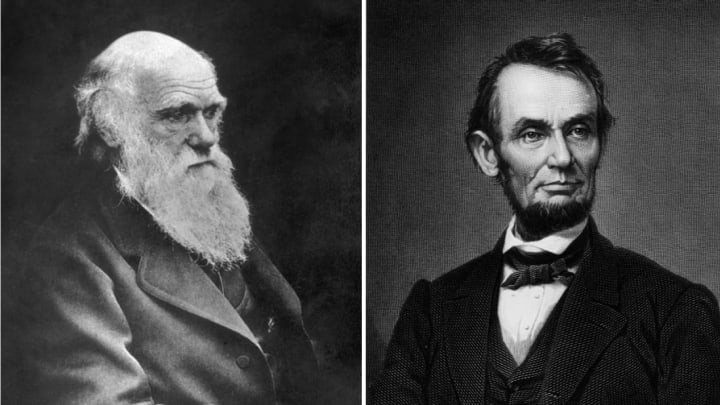On February 12, 1809, two of the most revolutionary men of the 19th century were born. Abraham Lincoln and Charles Darwin had a lot more in common than a knack for growing epic beards. For example ...
1. Both Men Loved Shakespeare.
As a young man, Darwin particularly enjoyed the Bard’s historical dramas, although he became tired of the playwright as he grew older. Lincoln, meanwhile, recited Shakespeare’s work extensively throughout his life. In an eerie coincidence, Honest Abe quoted the following line from Macbeth mere days before his assassination: “After life’s fitful fever, he sleeps well.”
2. Neither Man Rose to National Prominence Until Their Late Forties.
Although both men had previously enjoyed modest professional success, neither turned into a household name in their youth. For Lincoln, that all changed in 1858, when the Lincoln-Douglas debates helped him secure nationwide recognition and, eventually, the presidency. The following year, Darwin became one of the most famous scientists in history when On the Origin of Species was published after a lengthy gestation period.
3. Both Lost Their Mothers Early In Life.
Susannah Wedgwood Darwin lost her battle with an unknown disease on July 15, 1817. As for Nancy Hanks Lincoln, she died of milk sickness on October 5, 1818, at the age of 34.
4. Both Suffered Through the Death of a Young Child.
Edward Lincoln died shortly before his fourth birthday, while Anne Elizabeth Darwin succumbed to an unknown illness at the age of 10 (her devastated parents kept a box full of keepsakes which went undiscovered until 2000).
5. Both Loved Music, But Neither Could Sing.
Lincoln adored opera, while Darwin enjoyed listening to church choirs, classical concerts, and his wife’s piano-playing. Despite this shared affinity for music, the former man refused to sing around others and the latter was tone-deaf.
6. Both Were Abolitionists.
“If slavery is not wrong, nothing is wrong,” Lincoln once wrote. The “great emancipator’s” role in passing the Thirteenth Amendment, which officially eradicated slavery in the United States, speaks for itself. But Darwin, too, loathed the practice. While aboard the HMS Beagle (a voyage that inspired his theory of natural selection), Darwin frequently encountered “those atrocious acts which can only take place in a slave country.” He even weighed in on the American Civil War in a letter to New England botanist Asa Gray, writing “[I wish] that the North would proclaim a crusade against slavery … Great God, how I should like to see the greatest curse on earth, slavery, abolished.”
And Here’s One Critical Difference:
Lincoln was an avid cat fanatic, while Darwin was an avowed dog lover.
This article originally ran in 2014.
